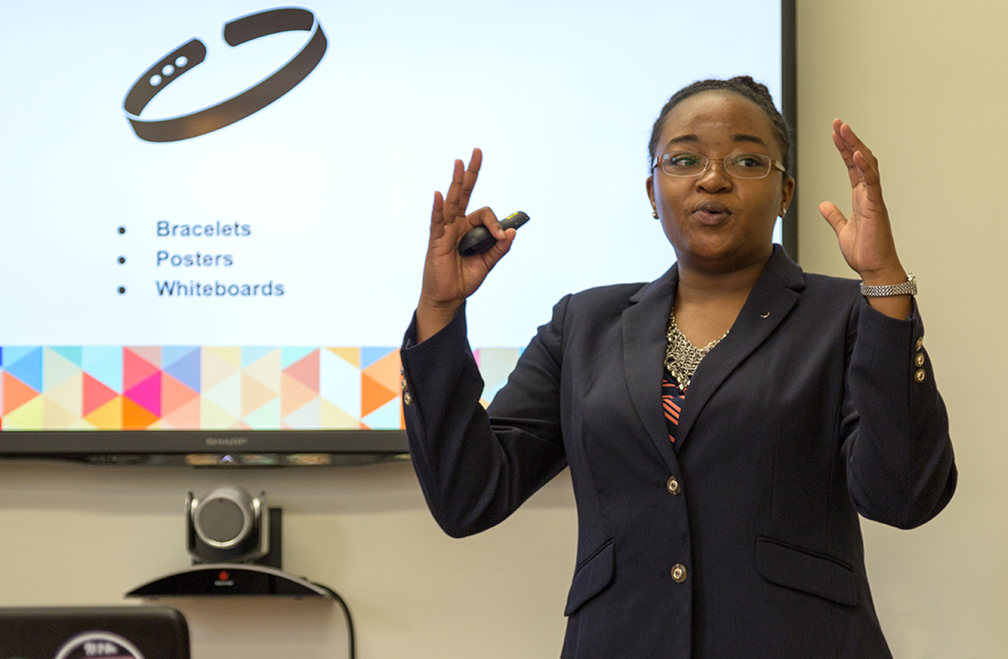Students Take Roles as Campus Innovators Through Global Design Program
November 10, 2017

A chance meeting changed Sunny Murthy’s idea of his perfect career.
In the summer of 2015, the Virginia Tech senior spent six weeks at the Yale School of Medicine, where he shadowed physicians and medical school students while taking physics and organic chemistry courses.
While walking through the Yale New Haven Hospital, Murthy struck up a conversation with the hospital’s vice president of cardiovascular services. The administrator became Murthy’s mentor and helped him see that he could combine business and health care into a career path.
This and other out-of-class experiences, coupled with his Virginia Tech work, defined Murthy’s direction. Now he is applying to medical school. He eventually wants to work as a physician and then progress to a career in politics and health care policy.
Murthy and a team of three other Virginia Tech students want to create a campus hub for students to learn about these same kinds of out-of-the classroom opportunities, from internships and study abroad to research and service-learning projects. Students, they said, often don’t know about the options available to help them embark on these important ventures.
The four students — Murthy, Najla Mouchrek, Danielle Jeffers, and Jarrodd Davis — comprise Virginia Tech’s first team of University Innovation Fellows. Stanford University’s Hasso Plattner Institute of Design runs this fellows program, and it advocates for college students across the globe to devise new ideas and projects for their institutions related to innovation, entrepreneurship, and design.

The Virginia Tech student team, who represent different majors and academic interests, presented their ideas to university administrators on November 9 during a ceremony in Burruss Hall.
“We all love the university, and we want to see it prosper,” said Murthy, who is majoring in biochemistry.
For the team, faculty chose students with an innovation mindset and whose interests cross many disciplines.
“They are movers and shakers at the student level,” said Leigh Lally, the team’s faculty mentor who proposed the fellows program for Virginia Tech. She is the university’s space manager.
The program delves perfectly with Mouchrek’s work as a doctoral candidate pursuing Virginia Tech’s first interdisciplinary Ph.D. in human-centered design. Working as a designer within universities for the last 17 years, Mouchrek developed a passion for applying design as an agent of change for youth development and engagement with social change.
“I really like the idea of participating in change at Virginia Tech,” she said.
On Nov. 16, the student team is headed to Stanford for several days to meet fellows from at least 62 institutions around the world, participate in workshops, and visit Google’s headquarters.
Their work started in September when they began an intense six-week online training for the program. They mapped Virginia Tech’s campus to highlight spaces that encourage entrepreneurship and interviewed students and faculty about challenges and opportunities for innovation and learning outside of the classroom, also called experiential learning.
After working for several hours each week, the students created a series of short- and long-term plans that they hope will lead to the launch of this proposed virtual and physical campus hub.
“Students need that,” said Jeffers, a junior who is majoring in multimedia journalism and already has had five internships and externships as a college student. “The world is bigger than the textbook.”
In one of her internships, Jeffers met a mentor Thomas Harrelson, chairman of GMH Global International, who helped her develop the idea for her own business, Dough 4 Degrees. It teaches students how to earn scholarships to go to college and graduate debt-free.
The proposed hub also would offer tips for funding out-of-the-classroom experiences, and peer mentoring from students who have had similar opportunities.
The fellows’ plans remain in the preliminary stages. Their next step includes more campus research, and the team also will help with a new student experiential learning conference planned at Virginia Tech for April 13.
The team, which will remain intact from year to year, hopes to develop a prototype of the hub by next November. As students graduate, new team members will be added and will undergo the same training process to further the work begun by the current leadership.
Davis said he hopes that his work as a fellow will show future employers that he is innovative.
“I want to demonstrate that I can be an agent of change where I am,” said Davis, a public and urban affairs major who plans to become an urban designer.
Written by Jenny Kincaid Boone







